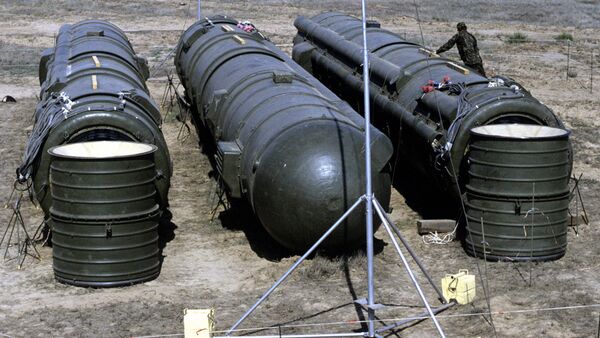"Russia and the US have met the New Start limits and that’s extremely important. But it’s the only good news of the last few years either in Moscow or in Washington. We don’t have to have a new arms race, but if we fail to extend the New Start Treaty, then I think that we will rapidly be in both a qualitative and quantitative arms race," Countryman, who served as the US under secretary for Arms Control and International Security, said.
The official continued by calling the New Start Treaty "a positive point in relations between Moscow and Washington because it has been treated very professionally by both sides."
"I think that the primary threat is that somebody in either Washington or Moscow will think we can’t agree to extension of this treaty until the other side does ‘a,b,c.’ That’s a fundamental miscalculation. This is not a Treaty that gives an advantage to either the US or the Russian Federation, and to treat it as if it is a favor or a blessing for the other side, when in fact it is an important force of stability for both sides, would be a mistake," Countryman pointed out.
READ MORE: US Expects to Continue Implementation of New START Treaty With Russia — DoS
The US ex-diplomat expressed regret that he did not know officials in Moscow who considered the treaty’s extension as a conditional thing, "as something we have to solve 18 other things first before we can take this very simple, very smart step — extending the Treaty."
"There is no good reason to delay extension of the Treaty. But I’m afraid it will be delayed," Countryman suggested.
Countryman noted that there was potential for US-Russian dialogue on the new arms control deal, adding that such dialogue has in a way begun with talks between Russian Deputy Foreign Minister Sergey Ryabkov and US Under Secretary of State for Political Affairs Thomas Shannon.
February 5 has been the deadline to which Moscow and Washington had to meet the New Start treaty provisions. The United States said it had met the requirements. The deal itself expires in 2021.
Moscow, however, said that it could not confirm the US compliance with the treaty, noting that Washington had met the requirement not due to reduction of its weapons, but due to the re-equipment of submarine-launched ballistic missile systems.
Iran’s Non-Nuclear Activities
Thomas Countryman expressed hope that the European states would agree with Washington regarding the need to take steps to restrain Iran’s alleged non-nuclear activities as part of the Joint Comprehensive Plan of Action (JCPOA).
"The current effort to discuss it between those three and the US is, I think, I hope, intended to reach a point where Europe makes a very strong statement about Iran’s non-nuclear activities and agrees to take actual measures that will restrain Iran in those activities," Countryman, who has served as the US under secretary for Arms Control and International Security, said.
France, Germany and the United Kingdom disagree with Washington about preserving the JCPOA and about whether it was a good agreement, Countryman continued.
"But they agree with the US President on two very important points that are outside of the JCPOA, that Iran should not continue to expand its ballistic missile capability, and that Iran should stop interfering, with both military support and terrorism, in the internal affairs of several of its neighbors. This is destabilizing," Countryman, who has served as the US under secretary for Arms Control and International Security, said.
The fact that Russia and China are not included in talks on the Iranian nuclear deal should not be surprising, Countryman noted.
"Diplomats like to talk about the variable geometry of negotiations. In negotiation of the JCPOA it wasn’t done everyday with 7 countries on the table. There were side meetings between the US and Iran, between the EU and Iran, between China and Russia and Iran. And those are all essential to the process of building a consensus," the official pointed out.
In late January, US Under Secretary for Public Diplomacy and Public Affairs Steven Goldstein said that the working group on the Iranian nuclear deal should find the solution to the issue before May.
Russian Deputy Foreign Minister Sergei Ryabkov has said, in turn, that the Moscow considered initiative of creating such a taskforce on improving the deal is a move which might undermine the agreement.
Signed in 2015, the JCPOA has been in effect since January 2016. The agreement between the European Union, Iran, and the P5+1 countries (China, France, Russia, the United Kingdom, and the United States, plus Germany) stipulates the gradual lifting of the economic and diplomatic sanctions imposed on Iran by Western countries in exchange for Tehran ending its nuclear program.




